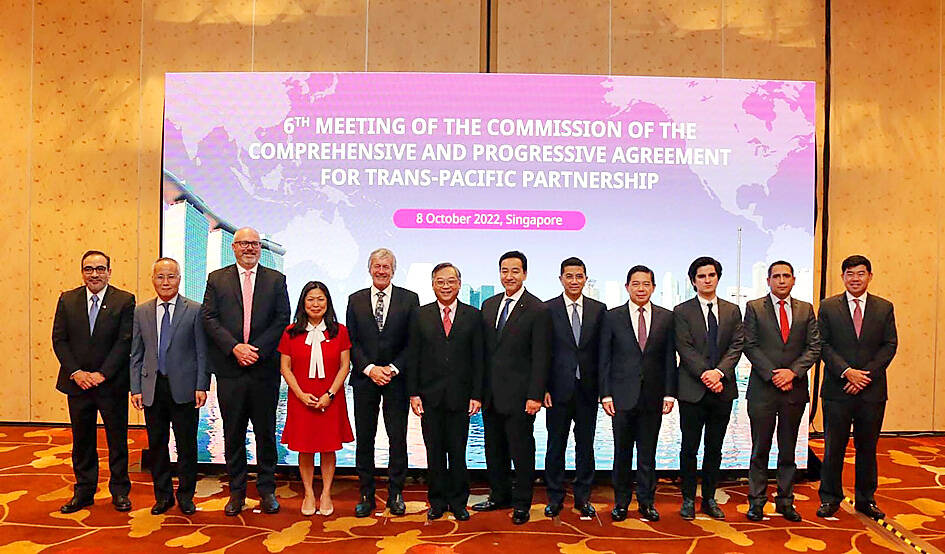Taiwan’s exports to nations belonging to the Comprehensive and Progressive Agreement for Trans-Pacific Partnership (CPTPP) expanded 23.8 percent in the first nine months of this year, while imports grew 14.9 percent, warranting Taiwan’s bid to join the free-trade bloc, data from the Directorate-General of Budget, Accounting, and Statistics (DGBAS) showed on Thursday last week.
The data was released one year after Taiwan announced its aim to join the CPTPP, which comprises 11 member states: Australia, Brunei, Canada, Chile, Japan, Malaysia, Mexico, New Zealand, Peru, Singapore and Vietnam.
The CPTPP’s members account for 13.4 percent of global GDP, at about US$13.5 trillion in total, making it one of the world’s largest free-trade areas, along with the North American Free Trade Agreement, the EU and the Regional Comprehensive Economic Partnership, the DGBAS said.

Photo courtesy of the Singaporean Ministry of Trade and Industry via CNA
DGBAS Statistics Department head Tsai Yu-tai (蔡鈺泰) said that Taiwan’s increase in trade with CPTPP member states had a lot to do with Taiwan benefitting from the contactless economy created by the COVID-19 pandemic.
That benefit is fading, explaining why exports lost momentum last quarter and might decline further this quarter and early next year, Tsai said.
Taiwan on Sept. 22 last year filed an official request to join the CPTPP and has made becoming a member its top policy priority, updating its fishing, medicine, investment, patent, trademark and intellectual property regulations to align with the trade body’s standards, the National Development Council has said.
CPTPP membership would positively affect local makers of textiles, garments, machinery and machine tools that remain heavily dependent on traditional manufacturing procedures and are sensitive to tariff changes, the Taiwan Institute of Economic Research (台灣經濟研究院) said.
As Taiwan’s textile products are relatively competitive in Asia, joining the CPTPP would boost that advantage, the Taipei-based think tank said.
While pursuing CPTPP membership, the government must not forget to boost relations with individual member economies, it said.
Exports last year to CPTPP markets soared 33 percent annually to US$94.99 billion, better than an average 9.3 percent increase over the previous five years, DGBAS data showed.
Shipments of electronics last year contributed US$41.32 billion, or 43.5 percent, followed by base metals and related products at US$8.31 billion, and information and communications technology products at US$7.8 billion, the DGBAS said.
Imports from CPTPP areas last year totaled US$108.61 billion, up 30 percent year-on-year, it said.
Electronics, mineral products and machinery were the top three import sectors, it said.

Intel Corp chief executive officer Lip-Bu Tan (陳立武) is expected to meet with Taiwanese suppliers next month in conjunction with the opening of the Computex Taipei trade show, supply chain sources said on Monday. The visit, the first for Tan to Taiwan since assuming his new post last month, would be aimed at enhancing Intel’s ties with suppliers in Taiwan as he attempts to help turn around the struggling US chipmaker, the sources said. Tan is to hold a banquet to celebrate Intel’s 40-year presence in Taiwan before Computex opens on May 20 and invite dozens of Taiwanese suppliers to exchange views

Application-specific integrated circuit designer Faraday Technology Corp (智原) yesterday said that although revenue this quarter would decline 30 percent from last quarter, it retained its full-year forecast of revenue growth of 100 percent. The company attributed the quarterly drop to a slowdown in customers’ production of chips using Faraday’s advanced packaging technology. The company is still confident about its revenue growth this year, given its strong “design-win” — or the projects it won to help customers design their chips, Faraday president Steve Wang (王國雍) told an online earnings conference. “The design-win this year is better than we expected. We believe we will win

Chizuko Kimura has become the first female sushi chef in the world to win a Michelin star, fulfilling a promise she made to her dying husband to continue his legacy. The 54-year-old Japanese chef regained the Michelin star her late husband, Shunei Kimura, won three years ago for their Sushi Shunei restaurant in Paris. For Shunei Kimura, the star was a dream come true. However, the joy was short-lived. He died from cancer just three months later in June 2022. He was 65. The following year, the restaurant in the heart of Montmartre lost its star rating. Chizuko Kimura insisted that the new star is still down

While China’s leaders use their economic and political might to fight US President Donald Trump’s trade war “to the end,” its army of social media soldiers are embarking on a more humorous campaign online. Trump’s tariff blitz has seen Washington and Beijing impose eye-watering duties on imports from the other, fanning a standoff between the economic superpowers that has sparked global recession fears and sent markets into a tailspin. Trump says his policy is a response to years of being “ripped off” by other countries and aims to bring manufacturing to the US, forcing companies to employ US workers. However, China’s online warriors